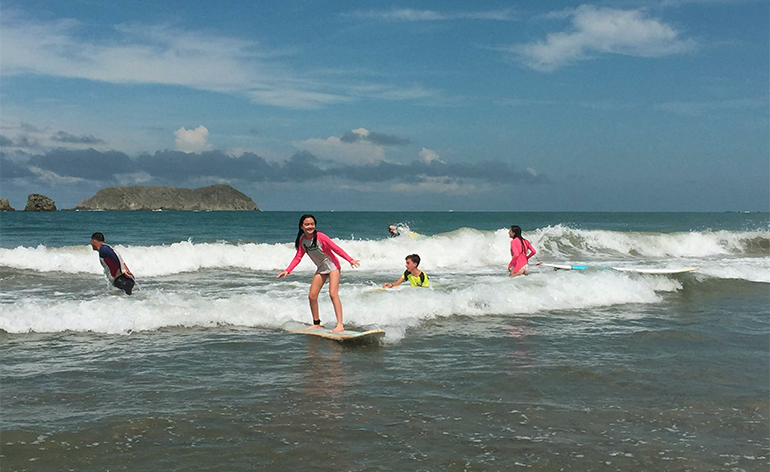Maybe it surprised you when your teen brought up the notion of traveling on their own, or perhaps they have talked about it for years. While they are thrilled by the idea of exploring a new country, you might not share the same excitement. We get it, you want to protect your child and make the best decisions for them. However, if it is hard to imagine your child traveling without you, then that’s all the more reason they should go.
This post will address the top concerns from parents who are hesitant to say “yes” to their child’s pleads to study or volunteer abroad.
“I don’t understand why my teen wants to travel.”
Like any of your child’s interests, it’s important to listen to why it’s something they enjoy. Are they passionate about reforestation in Puerto Rico? Do they love Spanish art? Fascinated by the history of pop culture influence in Japan? You do not need to share the same feelings, but taking the time to learn about why your child is interested in other cultures shows that you care about being a part of their life.
“Traveling is expensive.”
You’re right. And so are piano lessons, theatre camp, football equipment, and really any activity that your child gets involved in. It’s just a matter of choosing what takes a priority.
A lot of teens who travel pay for their program themselves by getting a job or fundraising. It builds work ethic, budgeting skills, and doesn’t cost you a thing.

“But we travel as a family.”
A family vacation can be educational, but it is not the same thing as a cultural immersion experience. Studying or volunteering abroad is not a long-term vacation. Teens learn what normal life is like in another country. A lot of things will feel a lot harder, like communicating with peers or learning cultural practices. These are the parts that feel so rewarding.
Traveling without family allows for that room to grow. Teens are expected to adapt and figure things out for themselves, within a safe and structured environment. Traveling without people they already know is the reason why teens call their time abroad the most influential experience in their life. It’s the first time they really feel independent and capable on their own.
“It’s not safe.”
This is probably the number one concern for parents, and rightly so. You don’t have first-hand experience of the country, and trusting other people with the most important thing in your life, your family, seems insane.
The truth is that even the safest places in the world seem daunting if you are unfamiliar with the area. Traveling through a program provider is so important because the locations have been specifically selected, host families have been vetted, and thousands of other people have done it before you.
“They just saw someone else do it on social media.”
We urge everyone to reflect on the true reasons they want to travel. If you wouldn’t travel without a camera, then maybe you should reevaluate what it is you’re trying to accomplish.
Ask your teen what it is they are looking to get out of the experience. You may be surprised by their thoughtful response. We have found that most travelers are interested in world issues, developing communication skills, or being pushed out of their comfort zones. Our programs are designed with that in mind.

“Whatever they want to do abroad they can do here.”
We can only speak for ourselves, but our programs offer excursions and activities that are authentic and specific to the country, like learning how to make stroopwafels in the Netherlands, anime courses in Japan, or elephant conservation research in Sri Lanka.
Even doing the same mundane activities abroad will be a different experience because travelers are interacting locals. This is when people truly grasp the similarities and differences between cultures.
“Going to high school abroad is too much of a time commitment. They will miss out on a lot.”
High schools outside of the US have the same clubs and sports that exchange students are welcome to join. For example, our First Time Traveler Scholarship recipient, Fiona MacDonald joined a local hockey team in Sweden so she could continue her sport while abroad.
Friends will still be here when they return. The time apart will allow your child to develop a sense of who they are as a person independently from their friends by developing leadership skills and core values.
There is so much more to gain from traveling than there is to lose. If your child wants to be an exchange student abroad, then they have most likely already weighed the pros and cons and have decided that missing a trimester, semester, or year is worth it for them.

“It will hurt them getting into college.”
This is another very common fear parents have about their child studying abroad. The college application process is more competitive than ever, so doing anything out of the ordinary might seem like it would hurt your child’s chances of getting into their dream school.
Studying abroad makes a college application stand out; it serves as an example of how your teen is not only ready for college but that they will thrive in it. Showcasing the ability to grow in a totally new environment, being self-motivated, and passionate about learning are all things that colleges look for in their students.
“But I will miss them.”
They will miss you too. But they will return feeling accomplished with a newfound appreciation for the world around them. What more can you ask for as a parent?

Leave a Reply